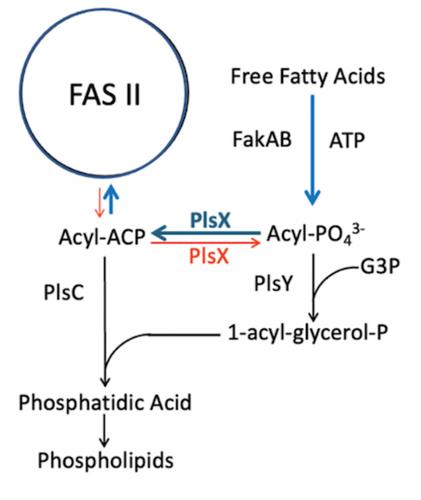当前位置:
X-MOL 学术
›
Mol. Microbiol.
›
论文详情
Our official English website, www.x-mol.net, welcomes your
feedback! (Note: you will need to create a separate account there.)
The Enteric Bacterium Enterococcus faecalis Elongates and Incorporates Exogenous Short and Medium Chain Fatty Acids Into Membrane Lipids
Molecular Microbiology ( IF 2.6 ) Pub Date : 2024-10-09 , DOI: 10.1111/mmi.15322 Qi Zou, Huijuan Dong, John E. Cronan
Enterococcus faecalis incorporates and elongates exogeneous short‐ and medium‐chain fatty acids to chains sufficiently long to enter membrane phospholipid synthesis. The acids are activated by the E. faecalis fatty acid kinase (FakAB) system and converted to acyl‐ACP species that can enter the fatty acid synthesis cycle to become elongated. Following elongation the acyl chains are incorporated into phospholipid by the PlsY and PlsC acyltranferases. This process has little effect on de novo fatty acid synthesis in the case of short‐chain acids, but a greater effect with medium‐chain acids. Incorporation of exogenous short‐chain fatty acids in E. faecalis was greatly increased by overexpression of either AcpA, the acyl carrier protein of fatty acid synthesis, or the phosphate acyl transferase PlsX. The PlsX of Lactococcus lactis was markedly superior to the E. faecalis PlsX in incorporation of short‐chain but not long‐chain acids. These manipulations also allowed unsaturated fatty acids of lengths too short for direct transfer to the phospholipid synthesis pathway to be elongated and support growth of E. faecalis unsaturated fatty acid auxotrophic strains. Short‐ and medium‐chain fatty acids can be abundant in the human gastrointestinal tract and their elongation by E. faecalis would conserve energy and carbon by relieving the requirement for total de novo synthesis of phospholipid acyl chains.
中文翻译:

肠道细菌粪肠球菌 (Enterococcus faecalis) 伸长并将外源性短链和中链脂肪酸掺入膜脂质中
粪肠球菌掺入并拉长外源性短链和中链脂肪酸,使其链长到足以进入膜磷脂合成。这些酸被粪肠球菌脂肪酸激酶 (FakAB) 系统激活并转化为酰基-ACP 物种,这些物种可以进入脂肪酸合成循环变得拉长。延伸后,酰基链被 PlsY 和 PlsC 酰基杂糖酶掺入磷脂中。在短链酸的情况下,这个过程对从头脂肪酸合成的影响很小,但对中链酸的影响更大。通过过表达 AcpA(脂肪酸合成的酰基载体蛋白)或磷酸酰基转移酶 PlsX,外源短链脂肪酸在粪肠球菌中的掺入大大增加。乳酸乳球菌的 PlsX 在掺入短链酸而不是长链酸方面明显优于粪肠球菌 PlsX。这些操作还允许长度太短而无法直接转移到磷脂合成途径的不饱和脂肪酸被拉长,并支持粪肠球菌不饱和脂肪酸营养缺陷型菌株的生长。短链和中链脂肪酸在人体胃肠道中可能很丰富,它们被粪肠球菌伸长将通过减轻磷脂酰基链的总从头合成的需求来节省能量和碳。
更新日期:2024-10-09
Molecular Microbiology ( IF 2.6 ) Pub Date : 2024-10-09 , DOI: 10.1111/mmi.15322 Qi Zou, Huijuan Dong, John E. Cronan

|
中文翻译:

肠道细菌粪肠球菌 (Enterococcus faecalis) 伸长并将外源性短链和中链脂肪酸掺入膜脂质中
粪肠球菌掺入并拉长外源性短链和中链脂肪酸,使其链长到足以进入膜磷脂合成。这些酸被粪肠球菌脂肪酸激酶 (FakAB) 系统激活并转化为酰基-ACP 物种,这些物种可以进入脂肪酸合成循环变得拉长。延伸后,酰基链被 PlsY 和 PlsC 酰基杂糖酶掺入磷脂中。在短链酸的情况下,这个过程对从头脂肪酸合成的影响很小,但对中链酸的影响更大。通过过表达 AcpA(脂肪酸合成的酰基载体蛋白)或磷酸酰基转移酶 PlsX,外源短链脂肪酸在粪肠球菌中的掺入大大增加。乳酸乳球菌的 PlsX 在掺入短链酸而不是长链酸方面明显优于粪肠球菌 PlsX。这些操作还允许长度太短而无法直接转移到磷脂合成途径的不饱和脂肪酸被拉长,并支持粪肠球菌不饱和脂肪酸营养缺陷型菌株的生长。短链和中链脂肪酸在人体胃肠道中可能很丰富,它们被粪肠球菌伸长将通过减轻磷脂酰基链的总从头合成的需求来节省能量和碳。


















































 京公网安备 11010802027423号
京公网安备 11010802027423号